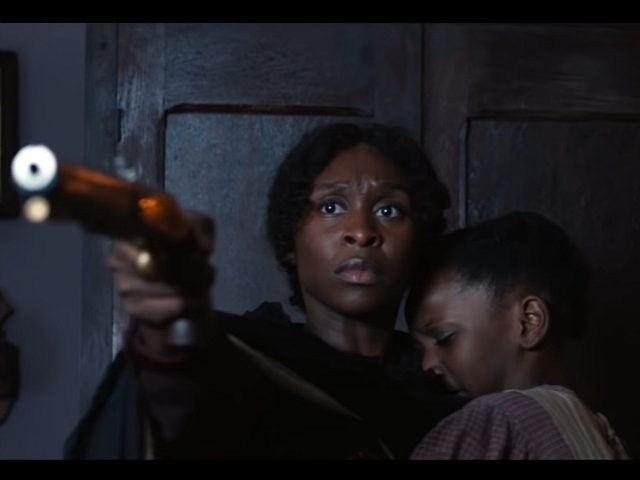There are many reasons to see Harriet, the new biopic about the escaped slave-turned-abolitionist Harriet Tubman. One reason, though, is to enjoy a refresher course on the power of the movie star.
Throughout its 125 minute runtime, Harriet is engaging, suspenseful, and rousing, and it still would have been all those things without Cynthia Erivo in the title role. Without her, though, Harriet would have also felt more like a television movie than something worthy of a theatrical release.
Erivo is nothing short of spectacular. She portrays Tubman with total conviction, in such a compelling way, you never once question that this five-foot ball of fury, intelligence, selflessness, courage, savvy, and righteousness could become the walking folk hero of her time — someone the slaves called “Moses” because God Himself helped her deliver them to freedom.
Born into slavery in 1822, by 1849, after seeing her sister sold off and her owner back out of his agreement to free her family, with the help of the Underground Railroad, Tubman bolts from her plantation in southern Maryland. She can’t read, so maps and signs are useless. She nearly drowns. It’s a hundred miles on foot with determined slave catchers right on her heels. Worst of all, she is all alone. Her husband, a free man, said he’d come with her. But if he’s caught, he will be returned to slavery, so she left him behind.
In Harriet’s mind, she is not really alone. “Just me and the Lord,” she says as she follows the North Star. Eventually, with the help of Quakers, she arrives in Philadelphia where the Railroad finds her a place to live, a paying job as a maid, and falsified papers.
A year passes. Harriet is safe and free. She’s also miserable. Like most people in her position, she misses her family. There’s something else. She’s not really free. She can’t be free knowing her family is still enslaved. So she goes back. All by herself, risking her freedom, her life… She goes back and keeps going back. First for her husband. Then for her brothers. Then for her sister. Then for her parents. Other slaves join them.
Sometimes the men think they know better. Sometimes, when things look hopeless, a runaway threatens them all by deciding to go back. Harriet puts a gun in their face — the indispensable equalizer for women. She’s in charge. She knows God is on her side. God speaks directly to her through visions, visions of the future, visions that reveal where slave catchers desperate to stop Moses have laid their trap.
Eventually, Harriet becomes the most successful conductor on the Underground Railroad, the only one to have never lost a runaway.
The Fugitive Slave Act threatens everything. Philadelphia is no longer safe. The law now says there are no safe havens for runaways, even in free states. Slaves can now be captured and returned to bondage. With the help of the great John Brown, Tubman escapes to Canada. Here, black intellectuals like Fredrick Douglass decide to wait for the inevitable Civil War, to agitate for that rather than take the risks that come from running the Railroad.
Tubman will have none of it. She shames them for being “comfortable and important.” She’s going back, even though what had been a hundred-mile escape route over the Mason-Dixon line is now a 500-mile escape route to Canada. She doesn’t care. She can’t be free until all slaves are free.
Other than the usual emotions that come with watching a terrific movie, and watching a star (Erivo) born before your very eyes, I was also incredulous. By the time Tubman’s leading — a black woman leading — an armed Civil War expedition that liberated hundreds of slaves — I was certain the movie had taken great dramatic license to make the story more exciting.
Nope.
It’s all true.
Then I wondered why the hell this story had not been told on film already, why it was being made on such a small budget ($17 million) when this is a story (and subject) that deserves the “epic movie treatment.”
My guess is that, in the past, Hollywood had a problem with Tubman’s biography because there’s no white savior to cast in the lead role. Tubman was a self-made woman. She was in charge. She was the leader. She was her people’s savior. She’s the unqualified hero.
Okay, but now we’re in the age of Woke, where you would think a studio would leap at the chance to tell the jaw-dropping, inspiring true story of a courageous and empowered black woman. Except… Harriet was an anti-science Christiantard.
Let’s not forget that Hollywood stripped the Christianity out of Jackie Robinson (42), Johnny Cash (Walk the Line), Louie Zamperini (Unbroken), and a Wrinkle in Time. You can’t do that with Tubman. Removing Tubman’s faith in Jesus would be like removing Robinson’s base-stealing skills or Cash’s songwriting ability. Tubman’s faith defined her, drove her, saved her. At the age of 91, her last words were “I go to prepare a place for you.”
“Liberty or death,” she explains at one point. “If I couldn’t have one, I’d have the other.”
Harriet Tubman was an instrument of God. She was also a Civil War veteran and American hero who received military honors at her funeral. If her story was fiction, no one would believe it. Harriet tells her story truthfully and tells it well.
Follow John Nolte on Twitter @NolteNC. Follow his Facebook Page here.

COMMENTS
Please let us know if you're having issues with commenting.